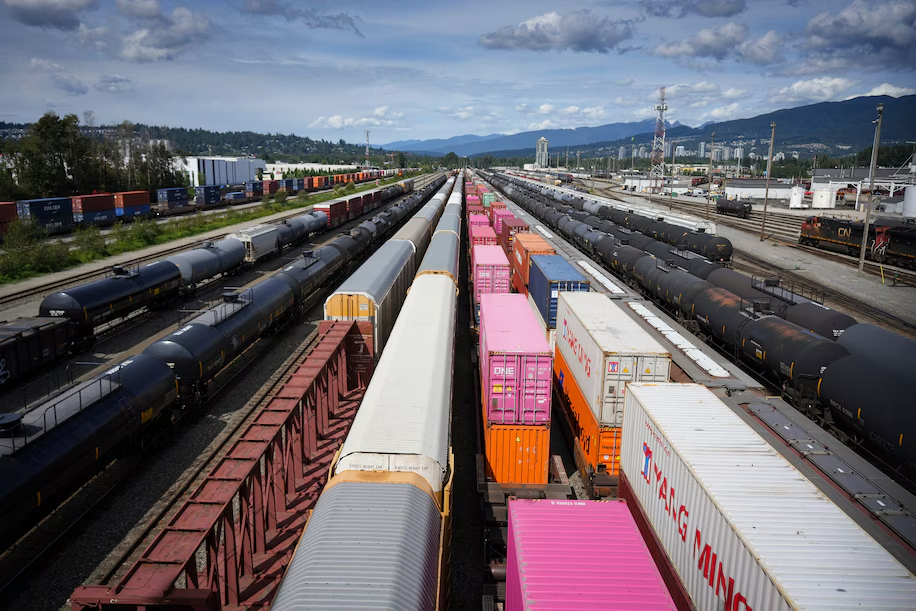A looming rail work stoppage in Canada is worrying U.S. businesses and threatening deliveries of cars, timber, petroleum products, grains and other crucial supplies.
Canadian Pacific Kansas City and Canadian National railroads, the country’s two largest railways, plan to lock out Teamsters members as soon as 12:01 a.m. Thursday.
Already, scheduled shipments of perishable and hazardous products, such as frozen food, propane, and chemicals used to purify water, have been halted, according to the companies.
Negotiations between the railroads and the Teamsters’ Canada-based rail workers are ongoing, and the Canadian government has rejected calls to intervene. The Teamsters are seeking guarantees around scheduling practices and safety provisions in response to “understaffing.” Meanwhile, the railroads say they have offered significant pay increases and addressed concerns about scheduling.
The consequences of a Canadian rail strike could be far-reaching. Canadian Pacific Kansas City advised over the weekend that starting Tuesday, it would stop all shipments that start in Canada, as well as those originating in the United States headed for Canada. The U.S. railway Union Pacific has said a shutdown would sideline more than 2,500 railcars from crossing the border each day, according to a company document reviewed by The Washington Post.
One of the largest U.S. rail unions, which is affiliated with the Teamsters, has told members that they can refuse to operate the two Canadian companies’ trains in the United States. The companies say they had planned to continue operations in the United States.
In a letter Tuesday, Edward A. Hall, president of the Brotherhood of Locomotive Engineers and Trainmen, instructed the union’s 51,000 members not to cross any “picket line they encounter” related to the labor dispute after the work stoppage begins, according to a copy of the letter obtained by The Post.
Canadian Pacific Kansas City issued a lockout notice to the union on Aug. 9. The union on Sunday issued a strike notice to the company. Separately, Canadian National issued the union a lockout notice on Sunday.
U.S. railroads and industry groups have been issuing warnings about the impact of a Canadian rail shutdown in the United States. Union Pacific CEO Jim Vena on Monday sent a letter to Canadian Labor Minister Steve MacKinnon warning of “devastating consequences for the Canadian and U.S. economies.”
In a separate letter Monday addressed to President Joe Biden as well as other U.S. and Canadian officials, dozens of trade associations including the American Farm Bureau Federation and the National Cotton Council said a rail shutdown would trigger “harmful consequences for Canadian and American agricultural producers, the agricultural industry, and both domestic and global food security.”
Each day of a work stoppage would require three to five days for the railroads to recover, said Jonathan Abecassis, a Canadian National spokesperson.
The dispute is over rail safety, scheduling practices and relocation notices, as the Teamsters Canada Rail Conference, which represents nearly 10,000 rail workers at the two companies, has been without contracts at the companies since the end of last year.
The Teamsters said the railroads are demanding “grueling on-call schedules” and concessions around worker scheduling and safety provisions “regardless of the risks” as the railroads face worker shortages. Canadian National is also forcing workers to relocate across the country for months at a time to combat understaffing, the union said. The union said it does not want to make sacrifices on its workers’ availability or relocations.
“Rail workers have only ever sought a fair and equitable agreement,” said Paul Boucher, president of the Teamsters Canada Rail Conference, in a statement. “Unfortunately, both rail companies are demanding concessions that could tear families apart or jeopardize rail safety.”
The rail companies said that they have been meeting with the union in recent days but that they remain at an impasse over key issues, forcing them to prepare for a rail shutdown.
“The union has failed to get serious,” Abecassis said. He added that the company had made several separate offers to the union since January with improved wages, including as much as $75 an hour in Canadian dollars for locomotive engineers, as well as other perks, but the union had not responded to any of them until this past weekend.
Patrick Waldron, a spokesperson for Canadian Pacific Kansas City, said in statement that the company “remains focused on and committed to arriving at a negotiated outcome that is in the best interests of all our railroaders.” He added that the railway had offered “significant wage increases” but had withdrawn an improvement intended to address the union’s concerns about scheduling because of union leadership’s opposition to that offer.
Rail transport carries billions of dollars of goods between Canada and the United States every month, according to the U.S. Department of Transportation. Roughly 30 percent of all freight rail operations in Canada cross into the United States each year, the Association of American Railroads said.
In 2022, Congress and Biden intervened in a dispute between U.S. railways and unions about concerns similar to those reported by Canadian rail workers, such as severe understaffing and grueling schedules, forcing a deal that averted a strike.
https://www.washingtonpost.com/business/2024/08/21/canada-rail-strike-lockout-teamsters/
